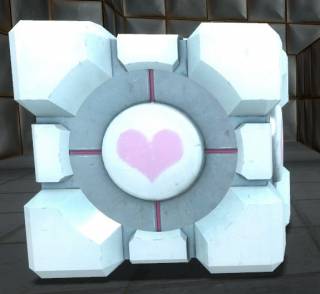The Evolution of Video Game Narrative- Part 2
By gamer_152 19 Comments
So, last week I talked about the large gap between the game design and writing that often exists in modern video games. This week I’m going to look at some examples of how gameplay and narrative can interrelate in games, and look at what games can do to overcome the conflict between these two components
Making the Connection
One way of looking at the gameplay-narrative problem is that if gameplay is the key component at the centre of every game then perhaps gameplay can be the way video games tell stories. All other storytelling mediums have learned how to use the core tools at their disposal to enhance their narratives; music writers know which sequences of notes make the listener feel which emotions, film and TV makers have learned to better evoke the emotions in their scenes through cinematography, maybe video games just have to work out how to utilise the game part of themselves correctly. After all we know that gameplay has the ability to foster unique emotions in us, it can make us feel triumph, disappointment, struggle, a sense of power, and many other feelings in a way that no other entertainment medium can.
A few months ago I was delighted to discover that I wasn’t the only one who held these beliefs about video games. Most people who know the name Jonathan Blow know him as the father of acclaimed indie game Braid, however Blow is much more than just the creator of a headache-inducing puzzle-platformer, he’s also a respected expert on video games and game design in general. I find Blow’s view of modern video game narratives rather cynical, but listening to him speak it’s obvious that within his mind gameplay and narrative are inextricably intertwined components of video games.
Lack of Connection

Blow highlights examples of disconnect between narrative and gameplay impacting the experience negatively even in games that have been very highly praised for their narrative, such as Bioshock and Half-Life 2. I can’t say my examples of this are as eye-opening as Blow’s but to avoid copy-pasting all of his work I am refraining from using his specific examples in this section.
One common conflict between gameplay and narrative Blow has highlighted is when a game is jarringly halted so that an AI character can engage in a conversation with the protagonist. This kind of practise is common in games and while developers seem to be getting a little better at dealing with it, I’m sure you can think of a handful of scenarios in which you’ve been annoyed by an AI character halting the gameplay to deliver a short speech to advance the plot. In these situations the narrative tells you that the AI character is your best friend, they’re your comrade in arms or your chirpy, loveable sidekick, but the gameplay pushes you in the other direction, making you annoyed at the character for interrupting the flow of the game and keeping you from playing.
Warning: Spoilers for the ending of Borderlands follow.
Connecting Effectively
These are examples that show how conflicts between narrative and gameplay can be damaging to the experience, but if we wish to see both sides of the coin here then we need highly recognisable examples of gameplay and narrative being excellently linked. Sadly those aren’t in huge supply, but that’s not to say there aren’t some great examples out there, and once again Blow stands out as best source of these examples. I must admit that I’m not entirely sure of the origin of the example I’m about to give. I believe the following is my adaptation of Blow quoting an online forum user, however, despite hours of digging I just couldn’t find the original source for this. It was far too good to be excluded from this blog though.

Anyone who’s played Portal will undoubtedly remember Testchamber 17, the home of the much beloved Weighted Companion Cube. A large part of the initial joke of the testchamber comes from the ridiculous premise that you might actually treat the large metal box you’re provided with as a friend, but as the testchamber wears on most find themselves developing an actual attachment to this inanimate object. The cube is the key tool in the level and your means of overcoming all obstacles and so the cube becomes an important part of the game world for you. This ultimately means that the last laugh is on the player because when it finally comes to incinerating the cube, a scene which on the surface would appear to be nothing more than a silly joke, most feel a genuine reluctance to part with the cube. This kind of attachment to an inanimate object was something that was fostered in a unique way via the game.
This link between gameplay and narrative also shines through in Blow’s own work. The story of Braid begins by telling players about the separation of the protagonist from his wife and how he wishes he could turn back time and undo his mistakes. Any other entertainment medium could have told us how the character felt but Braid used the gameplay to try and make us feel what it would be like to reverse time and erase our errors. Another of my favourite examples from Braid is later in the game and involves the protagonist’s wedding ring. The game tells us that the ring makes the protagonist feel as though time is slowing when he gets close to it, but you can’t experience that feeling for yourself until you can use the ring as an item in-game that really can slow down time. On the surface Braid is a regular puzzle-platformer but it takes the gameplay and utilises it in such a way that it becomes a metaphor for the emotions of the story. Perhaps it is this kind of symbolic gameplay-narrative link could be essential in creating many games in the future.
The Future of Narrative
There are more examples of these kinds of gameplay-narrative connections, but I think you get the idea. Personally when I began to think about this concept I felt a little unsettled, because if this relationship between gameplay and narrative is to be part of the core philosophy of future games development, then that means that all games up until now that have had any kind of involved story will be made somewhat redundant. I want to emphasise again though that I’m not trying to say that every video game out there has poor narrative, there are a lot of games which I’ve loved the characters, world, and plot of, however, the idea of games in the future executing their stories in the same way that games like Portal and Braid have been able too does sound like a very exciting prospect. Being an area in which the industry has so little experience it’s hard to imagine where games really go from here if they are to take on the challenge of linking narrative and gameplay so strongly, but if it’s the logical future for the medium (which I believe it is) then you can be sure designers and writers will find ways to do it.

It’s unlikely to just be a case of developers figuring out how to make that link though, we’ll probably also need to see a considerable change in the “core” games consumer base before the industry can adopt this practise on a significant scale. While there’s certainly a large audience for story-oriented games, currently the main demographic of “core gamers” are average young males, the action movie crowd. As we see more people becoming part of the “core” consumer base who want stories different from what the average action movie offers then we’re going to see publishers funding games that will have to find a way to express narrative beyond stories of war and young adventurers chosen to fight off evil forces.
With this world of integrated plots and gameplay seeming so far off you could conclude that it’s something we’re never going to witness but I believe that wouldn’t be a sensible conclusion to draw. Every entertainment medium before now has continued to diversify and evolve since its birth, there’s no reason to assume that just because there are hurdles for video games to overcome, the evolution of this one aspect of video games is going to grind to a halt. I believe that as video games truly embrace narrative as a key part of the experience this interplay of gameplay and story will be essential, and I can’t wait to see it happen. Good luck, have Batchief.
-Gamer_152